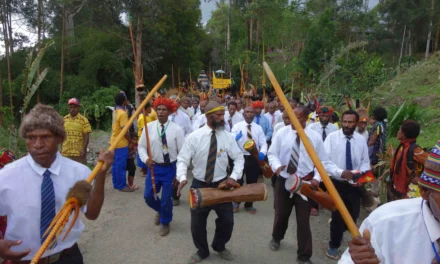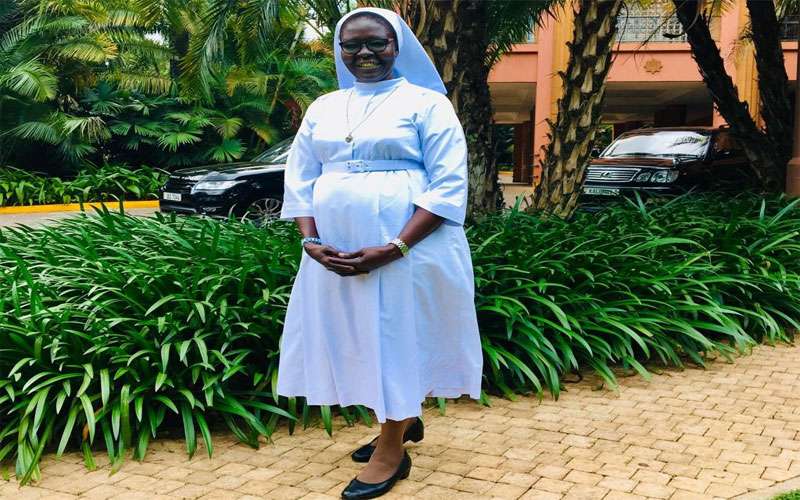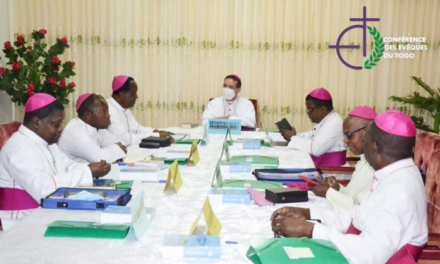



A AGÊNCIA DE NOTÍCIAS DA RECOWACERAO se esforça para manter vivas as memórias de seus heróis passados enquanto exalta os grandes ataques de seus heróis atuais. Um daqueles homens do passado que cavaram a fundação do RECOWA-CERAO sobre a qual estamos construindo agora foi Hyacinthe Cardinal Thiandoum. A AGÊNCIA DE NOTÍCIAS DA RECOWACERAO decidiu comemorar este herói caído nesta edição. Quem foi o cardeal Hyacinthe? Ele foi o primeiro arcebispo indígena de Dakar e o primeiro senegalês a ter um título de cardeal.
Nascido em Poponguine, na região de Thiès (oeste), em 2 de fevereiro de 1921, ele era filho de um catequista. Sua família é católica, mas um de seus irmãos, que se tornou muçulmano, teve filhos imãs. Foi ordenado sacerdote em 1949 e nomeado arcebispo de Dakar em fevereiro de 1962, aos 41 anos, cargo que ocupou por 38 anos, até sua aposentadoria em 2000.
Ele sucedeu o chefe da diocese de Dakar, a Dom Marcel Lefèvre, tornando-se o segundo arcebispo da capital senegalesa e o primeiro arcebispo indígena dessa diocese.
Vaticano 2 e Sínodo dos Bispos
Ele foi um dos atores do Concílio Vaticano II, tendo participado de todas as sessões. Ele fez discursos importantes no Conselho sobre reforma litúrgica, com atenção especial à inculturação (ritos particulares dos católicos africanos e a possibilidade de introdução de idiomas locais). Ele também falou sobre a questão do ecumenismo e das comunicações sociais.
Nas Assembléias do Sínodo dos Bispos (onde ele representava a Conferência Episcopal do Senegal / Mauritânia, na época), ele falou do pluralismo na Igreja. Ele também defendeu o sacerdócio ministerial enfatizando o valor do celibato sacerdotal. Finalmente, ele abordou outros assuntos, como o direito dos povos à autodeterminação e as dificuldades da evangelização nos países em desenvolvimento.
O cardeal Thiandoum era membro da Secretaria-Geral do Sínodo dos Bispos e presidente delegado da 4ª Assembléia Geral do Sínodo dos Bispos em 1977, sobre o tema: « Catequese hoje, com atenção especial às crianças e jovens ».
Ele trabalhou em estreita colaboração com Bernard Yago, o primeiro bispo e o primeiro cardeal da Costa do Marfim.
Foi presidente da Conferência Episcopal do Senegal / Mauritânia até 1987. Também foi vice-presidente do Simpósio das Conferências Episcopais da África e Madagascar (SECAM). Foi relator na 7ª Assembléia Geral do Sínodo dos Bispos sobre os Leigos em 1987 e relator geral na Assembléia Especial para a África do Sínodo dos Bispos em 1994.
De 19 a 23 de fevereiro de 1992, ele recebeu o papa Jean-Paul em Dakar, um evento sem precedentes neste país predominantemente muçulmano, onde a passagem do Santo Padre foi experimentada como apoio ao diálogo islâmico-cristão.
Homenagens
Quando ele morreu, em 18 de maio de 2004, recebeu numerosos tributos, incluindo o de seu sucessor à frente da diocese de Dakar, o cardeal Theodore Adrien Sarr, o do chefe de estado senegalês da época, Abdoulaye Wade, além de muitos outros. líderes religiosos muçulmanos senegaleses. Um de seus colegas, o cardeal beninense Bernardin Gantin, deu-lhe este testemunho: « ele tinha uma lealdade visceral à África e era inteiramente dedicado a este continente ». Em seu grande livro, “Levante-se! Vamos lá! O próprio Papa João Paulo II expressou sua afeição e admiração pelo arcebispo Thiandoum.
xxxxxxxxxxxxx
L’AGENCE DE NOUVELLES DE RECOWACERAO s’efforce de garder en vie les souvenirs de ses héros passés tout en vantant les grandes qualités de ses héros actuels. Hyacinthe CardinalThiandoum était l’un de ces hommes du passé qui a creusé les fondations de RECOWA-CERAO sur lesquelles nous sommes en train de construire. L’AGENCE DE NOUVELLES RECOWACERAO a décidé de commémorer ce héros tombé dans cette édition. Qui était le cardinal Hyacinthe? Il fut le premier archevêque indigène de Dakar et le premier sénégalais à porter un titre cardinal.
Né à Poponguine, dans la région de Thiès (Ouest) le 2 février 1921, il était fils de catéchiste. Sa famille est catholique, mais l’un de ses frères, devenu musulman, a eu des enfants imams. Il a été ordonné prêtre en 1949 et nommé archevêque de Dakar en février 1962, à 41 ans, poste qu’il a occupé pendant 38 ans, jusqu’à sa retraite en 2000.
Il succède au chef du diocèse de Dakar, à Mgr Marcel Lefèvre, devenant le deuxième archevêque de la capitale sénégalaise et le premier archevêque indigène de ce diocèse.
Vatican 2 et Synode des évêques
Il était l’un des acteurs du Concile Vatican II, ayant assisté à toutes les sessions. Il a notamment prononcé des discours importants au Conseil sur la réforme liturgique, avec une attention particulière à l’inculturation (rites particuliers des catholiques africains et possibilité d’introduction des langues locales). Il a également parlé de la question de l’œcuménisme et des communications sociales.
Aux Assemblées du Synode des évêques (où il représentait à l’époque la Conférence épiscopale du Sénégal / Mauritanie), il a parlé du pluralisme dans l’Église. Il a également plaidé pour le sacerdoce ministériel en soulignant la valeur du célibat sacerdotal. Enfin, il a abordé d’autres sujets tels que le droit des peuples à l’autodétermination et les difficultés d’évangélisation dans les pays en développement.
Le cardinal Thiandoum a été membre du Secrétariat général du Synode des évêques et président délégué de la 4e Assemblée générale du Synode des évêques en 1977 sur le thème: « La catéchèse aujourd’hui, avec une attention particulière pour les enfants et les jeunes ».
Il a travaillé en étroite collaboration avec Bernard Yago, premier évêque et premier cardinal ivoirien.
Il a été président de la Conférence épiscopale du Sénégal / Mauritanie jusqu’en 1987. Il a également été vice-président du Symposium des Conférences épiscopales d’Afrique et de Madagascar (SECAM). Il a été rapporteur à la 7e Assemblée générale du Synode des évêques sur les laïcs en 1987 et Rapporteur général à l’Assemblée spéciale pour l’Afrique du Synode des évêques en 1994.
Du 19 au 23 février 1992, il a reçu le pape Jean-Paul à Dakar, un événement sans précédent dans ce pays à prédominance musulmane où le passage du Saint-Père a été vécu comme un soutien au dialogue islamo-chrétien.
Hommages
À sa mort le 18 mai 2004, il a reçu de nombreux hommages dont celui de son successeur à la tête du diocèse de Dakar, le cardinal Théodore Adrien Sarr, celui du chef de l’État sénégalais de l’époque, Abdoulaye Wade en plus de nombreux les chefs religieux musulmans sénégalais. Un de ses pairs, le cardinal béninois Bernardin Gantin, lui a donné ce témoignage: « il avait une loyauté viscérale envers l’Afrique et était entièrement dévoué à ce continent ». Dans son grand livre, «Lève-toi! Allons-y! Le pape Jean-Paul II lui-même a exprimé son affection et son admiration pour l’archevêque Thiandoum.
Xxxxxxxxxxxxxx
RECOWACERAO NEWS AGENCY makes an effort to keep alive the memories of her past heroes while extolling the great fits of her current heroes. One of those men of the past who dug the foundation of RECOWA-CERAO on which we are now building was Hyacinthe CardinalThiandoum. RECOWACERAO NEWS AGENCY decided to commemorate this fallen hero in this edition. Who was Cardinal Hyacinthe? He was the first indigenous Archbishop of Dakar and the first Senegalese to bear a cardinal title.
Born in Poponguine, in the region of Thiès (West) on February 2, 1921, he was the son of a catechist. His family is Catholic, but one of his brothers, who has become a Muslim, has had Imam children. He was ordained a priest in 1949 and appointed archbishop of Dakar in February 1962, at 41, a position he held for 38 years, until his retirement in 2000.
He succeeded the head of the diocese of Dakar, to Mgr Marcel Lefèvre, becoming the second archbishop of the Senegalese capital and the first indigenous archbishop of this diocese.
Vatican 2 and Synod of Bishops
He was one of the actors of Vatican Council II, having attended all the sessions. He notably made important speeches at the Council on liturgical reform, with special attention to inculturation (particular rites of African Catholics and the possibility of introducing local languages). He also spoke on the issue of ecumenism and on social communications.
At the Assemblies of the Synod of Bishops (where he represented the Episcopal Conference of Senegal / Mauritania, at the time) he spoke of pluralism in the Church. He also advocated for the ministerial priesthood by emphasizing the value of priestly celibacy. Finally, he touched on other subjects such as the right of peoples to self-determination and the difficulties of evangelization in developing countries.
Cardinal Thiandoum was a member of the General Secretariat of the Synod of Bishops and delegate president of the 4th General Assembly of the Synod of Bishops in 1977 on the theme: « Catechesis today, with particular attention to children and young people ».
He worked closely with Bernard Yago, the first bishop, and first Ivorian cardinal.
He was president of the Episcopal Conference of Senegal / Mauritania until 1987. He was also the vice-president of the Symposium of the Episcopal Conferences of Africa and Madagascar (SECAM). He was rapporteur at the 7th General Assembly of the Synod of Bishops on the Laity in 1987 and General Rapporteur at the Special Assembly for Africa of the Synod of Bishops in 1994.
From February 19 to 23, 1992, he received Pope Jean-Paul in Dakar, an unprecedented event in this predominantly Muslim country where the passage of the Holy Father was experienced as support for Islamic-Christian dialogue.
Tributes
When he died on May 18, 2004, he received numerous tributes including that of his successor at the head of the diocese of Dakar, Cardinal Theodore Adrien Sarr, that of the Senegalese head of state at the time, Abdoulaye Wade in addition to many from the Senegalese Muslim religious leaders. One of his peers, Beninese Cardinal Bernardin Gantin, gave him this testimony: « he had a visceral loyalty to Africa and was entirely devoted to this continent ». In his great book, “Get up! Let’s go! Pope John Paul II himself expressed his affection and admiration for Archbishop Thiandoum.
- CATHOLIC ARCHBISHOP IN GHANA HAILS POPE LEO XIV AS GOD’S GIFT - 23 mai 2025
- POPE LEO XIV TO APPROVE CANONIZATIONS - 22 mai 2025
- THE EVOLUTION OF PAPAL TRANSPORTATION - 20 mai 2025







